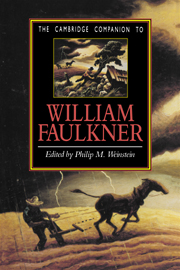8 - Absalom, Absalom!
(Un)Making the Father
from Part II - The World in the Texts
Published online by Cambridge University Press: 28 May 2006
Summary
Wind ye down there, ye prouder, sadder souls! question that proud, sad king! A family likeness! aye, he did beget ye, ye young exiled royalties; and from your grim sire only will the old State-secret come.
- Melville, Moby-DickSince the 1970s, feminist literary critics have both expanded the American canon and called into question the masculinist values on which it is based. Expansion has led to the incorporation of many previously neglected female writers, from Stowe and Jacobs in the nineteenth century to Cather and Hurston in the twentieth. Meanwhile, the work of Sandra Gilbert, Susan Gubar, and Jane Tompkins, among others, has served to reveal the (sometimes obsessive) misogyny at work in canonical male texts, as well as the masculinist bias of the canon makers themselves. Yet it has more recently become clear that a feminist criticism limited to rescuing important female writers and demystifying important male ones - what Elaine Showalter long ago called gynocriticism and feminist critique, respectively - cannot adequately address the questions raised by the work of certain already canonical American writers such as Hawthorne, Melville, and Faulkner. Their work presents an engagement with gender that is far too complex to be treated as merely symptomatic of the American canon’s masculinist bias. Just as Stein and Dickinson, arguably the only female writers with full canonical status in the United States before the feminist revision, have received reinvigorated critical attention from feminist critics who regard gender itself as a cultural construction, one that is - in the words of Frann Michel - "socially and historically variable/' as well as "internally contradictory" (5), a similar understanding of gender makes the work of even a Hawthorne, that infamous protester against a "damned mob of scribbling women," the site of renewed feminist analysis for critics such as Joel Pfister and Lauren Berlant.
- Type
- Chapter
- Information
- The Cambridge Companion to William Faulkner , pp. 168 - 196Publisher: Cambridge University PressPrint publication year: 1995
- 5
- Cited by



